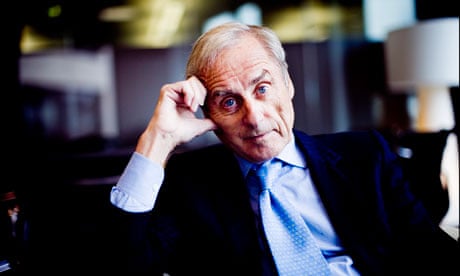Sir Harold Evans has launched a scathing attack on the manufacturer of thalidomide after it apologised for the first time to the victims of the birth defects tragedy from more than 50 years ago.
Writing in the Observer, the former Times and Sunday times editor who spearheaded a campaign to get compensation for families affected by the anti-morning sickness drug, described the Grünenthal Group as "reckless" and said the admission of guilt was half a century too late.
He wrote: "How do you wrestle with your conscience when the injustice you have perpetrated has destroyed the lives of children and left thousands of thalidomide victims still enduring pain and suffering, without adequate compensation?"
His comments came after the German company unveiled a thalidomine memorial statue on Friday and released a statement saying it "regrets" the consequences of the drug which led to babies being born without limbs during the 1950s and 1960s.
The company's chief executive, Harald Stock, said Grünenthal had failed to reach out to the victims and their mothers "from person to person" over the past 50 years. "Instead, we have been silent and we are very sorry for that," he said.
But Evans rejected the apology, saying "justice delayed is justice denied". He accused the company of failing to test the drug effectively and ignoring early warnings about its side effects in pursuit of profit.
Thalidomide was created by Grünenthal in 1953 and used in the late 1950s and early 1960 as a drug to treat morning sickness, headaches, coughs, insomnia and colds.
However, in 1961 an Australian doctor, William McBride, wrote to the Lancet after noticing an increase in deformed babies born at his hospital – all to mothers who had taken thalidomide.
The drug was withdrawn from the market later that year but it was estimated that 10,000 babies were born around the world with defects caused by thalidomide.
Families of those affected in the UK then found themselves locked in a long legal battle for compensation against the Distillers Biochemicals Limited (now Diageo) which was responsible for distributing the drug in Britain.
As editor of the Sunday Times, Evans launched an investigation into the causes and consequences of the disaster and led a campaign for compensation which saw Diago pay out £28m to British victims in 1968.
Evans described the drug as having "murky origins" and claims investigations into the origins of thalidomide can be traced back to murderous experiments in second world war concentration camps.
He accuses the company of remaining silent on adjusting compensation for victims to reflect inflation and says the fight for justice will continue for the thousands of victims who still endure pain and suffering more than 50 years on.


